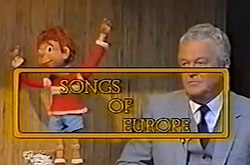Songs of Europe (1981 concert)
Songs of Europe is a concert television programme commemorating the Eurovision Song Contest's twenty-fifth anniversary. The event was held in Mysen, Norway in 1981, featuring nearly all the winners of the Eurovision Song Contest from its first edition in 1956 to 1981, and broadcast to more than 100 million viewers all over Europe.
| Songs of Europe | |
|---|---|
 | |
| Dates | |
| Final | 22 August 1981 |
| Host | |
| Venue | Mysen, Norway |
| Presenter(s) | Rolf Kirkvaag Titten Tei |
| Conductor | Sigurd Jansen |
| Directed by | Johnny Bergh |
| Executive supervisor | Frank Naef |
| Host broadcaster | EBU, NRK |
| Participants | |
| Number of entries | 21 songs from 1956 to 1981 |
The concert, which was the largest ever in Norway at the time, and still the largest in Mysen, was hosted by Norwegian television personalities Rolf Kirkvaag and Titten Tei, who led the two-hour live broadcast in English, German, French, Norwegian and Spanish. The majority of entries were conducted by Sigurd Jansen, although the song "Hallelujah" was conducted, as it was in 1979, by composer Kobi Oshrat.[1] "Nous les amoureux" was conducted by Raymond Bernard, "La, la, la" by Manuel Gas, and "Boom Bang-a-Bang" by Kenny Clayton.[2]
Background
It is the biggest concert arranged to feature such an amount of Eurovision Song Contest artists and more specifically winners performing at once, with 21 out of a total 29 winners (four winners in the 1969 Contest) attending to perform their past winning songs; that is with the Eurovision Song Contest's fiftieth anniversary, Congratulations: 50 Years of the Eurovision Song Contest, featuring most of the artists as guests and not as performers, and the Contest's sixtieth anniversary, Eurovision Song Contest's Greatest Hits, featuring fifteen artists acts.
The show
Heavy rain delayed the start of the concert and interrupted some of the early performances. The songs were performed and shown in videos, in accordance to the chronological order of the Eurovision Song Contest's winners from the first edition in 1956 up to and including the 1981 edition; although 1981 was the 26th edition, it was held a few months prior to the concert and thus included in it.
Some snippets of earlier ESC performances intermingled into the show. 21 acts performed their winning songs live (although Dana lip-synched her winning song), including three out of the four winners of the 1969 Contest. The remaining eight winners, marked in light red, were shown in video footage of their performances in their respective editions of the Eurovision Song Contest, where available. Others were shown in still photographs or in clips taken from other broadcasts where no clip from the contest was known to exist. Abba's performance of Waterloo was taken from a televised concert the group had performed in Mysen in 1975.
Notes:
- 1.^ Attended the show as a guest in the audience.
- 2.^ The song also contains phrases in French.
- 3.^ The line up of Teach-in was different from the winning 1975 group, although still led by lead singer Getty Kaspers.
- 4.^ Gali Atari who was part of Milk and Honey when they won, had by this point been replaced by Leah Lupatin.
International broadcasting
In the United Kingdom, a highlights programme was broadcast by BBC Two on 25 September 1981 and introduced by Terry Wogan.[3] BBC Radio 2 transmitted the concert on 26 December 1981, introduced by Len Jackson.[4]
Commentators
The following countries, listed in order of broadcasting dates, had confirmed that they would broadcast the anniversary show.[5]
| Date of broadcast | Country[6] | Channel | Station | Commentators |
|---|---|---|---|---|
| 22 August 1981 | DR | DR TV | TBC | |
| France Télévisions | Antenne 2 | No commentator | ||
| RTÉ | ||||
| Las Estrellas | ||||
| NRK | NRK Fjernsynet | Knut Aunbu | ||
| NRK[7] | TBC | |||
| 25 September 1981 | BBC | BBC Two | Terry Wogan | |
| 26 December 1981 | BBC Radio 2 | Len Jackson | ||
| Unknown | ORF | FS2 | No commentator | |
| BRT | BRT1 | |||
| CyBC | RIK 1 | |||
| ERTU | Channel 1 | |||
| TCS | Canal 2 | |||
| Yle | Yle TV1 | |||
| ARD | Das Erste | TBC | ||
| JRTV | JTV 2 | No commentator | ||
| ERT | ERT1 | |||
| RÚV | RÚV1 | |||
| NPO | NPO 1 | |||
| ATV | ||||
| RTP | RTP1 | |||
| CERTV | RTD | |||
| RTVE | La 1 | |||
| SVT | TV2 | Arne Weise | ||
| VTV | No commentator | |||
Non-broadcasting countries
The following countries were originally intended to broadcast the event, but withdrew for unknown reasons
| Country | Station | Channel |
|---|---|---|
| RTHK | ||
| IBA | Channel 1 | |
See also
References
- https://www.youtube.com/watch?v=_R8MYZjo778. Missing or empty
|title=(help) - https://www.youtube.com/watch?v=EbLVcswWSN4. Missing or empty
|title=(help) - "Songs of Europe - BBC Two England - 25 September 1981 - BBC Genome". genome.ch.bbc.co.uk. Retrieved 20 September 2018.
- "Songs of Europe - BBC Radio 2 - 26 December 1981 - BBC Genome". genome.ch.bbc.co.uk. Retrieved 20 September 2018.
- Wærhaug, Sølvi (24. august 1981). «Nesten krise …». VG. s. 36.
- Wærhaug, Sølvi (18. august 1981). «Fire verdensdeler følger Momarkedet». VG. s. 37.
- Wærhaug, Sølvi (20. august 1981). «TV-nerver i helspenn». VG.